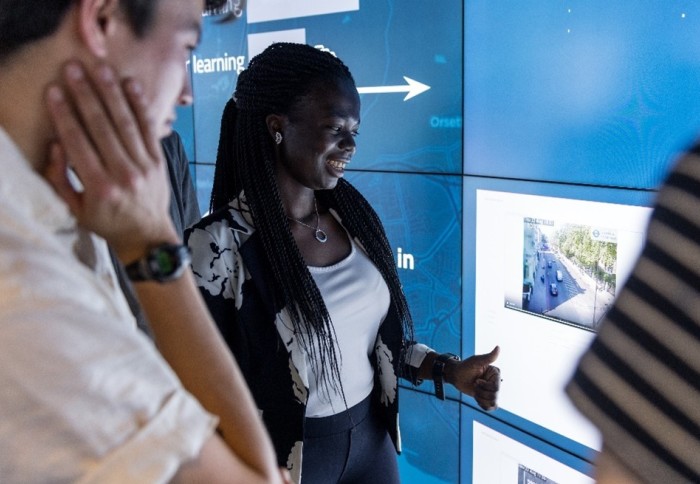Working towards inclusive societies to reduce inequalities: Imperial and SDG 10

Imperial’s community is adopting a radical approach to help meet Sustainable Development Goal (SDG) 10 to close the gap on inequalities.

Interdisciplinary research and work are being conducted at Imperial to drive transformative change and global, system-wide inclusion, to help meet SDG 10.
Addressing inequality requires a multi-pronged approach because inequality itself is multifaceted. Equity issues related to gender, ethnicity, race, health, education, and socio-economic status, among other factors, have been persistent around the globe.
According to the United Nations, the COVID-19 pandemic exacerbated inequalities between and within countries at a level not seen in a generation. As strategies are enacted to accelerate pandemic recovery, it is vital to cultivate inclusive societies that empower people to live dignified lives, so no one is left behind.
Health as an Indicator for Equity
The COVID-19 pandemic placed a spotlight on healthcare and health systems, especially as a determinant of healthy societies. Yet, health systems are not inherently equipped to be equitable and can perpetuate systemic inequities and racial discrimination through inaccessible service offerings, implicit biases, and unavailable culturally and contextually relevant care.
However, Dr. Thomas Hone, at Imperial’s School of Public Health, said: “Health systems can play an important role in enhancing equity.” Through research commissioned by the World Health Organization, Dr. Hone wrote about the benefits of “strengthening primary health care to tackle racial discrimination, promote intercultural services and reduce health inequities.” – an example of just one inequity that health systems can address. Health systems which are better oriented to primary health care (PHC) systems can provide more local, accessible, and culturally competent care with a lens on social justice, health equity, and community engagement on decisions relating to health and well-being.
Health systems also have benefits in impact areas beyond health. Health services are large employers of women, so investments in health systems can contribute to the learning, development, and empowerment of women in local communities. Therefore, health systems can also contribute to SDG 3 (Good Health and Well-being) and SDG 5 (Gender Equality).
Health systems also require and employ an educated workforce, so there are opportunities for community trainings and skill building to prepare nurses to take on local healthcare work. Dr. Hone researched health systems in Brazil, where he said there are efforts that involve, “investing in training lay workers to work as community health workers.” This cultivates a community-oriented approach to health systems, and if replicated in other countries, may reduce inequities on a larger scale.
Inclusive Innovation to Improve Global Communities
While the COVID-19 pandemic worsened global inequalities, they were already existent before. Globalisation and technological advancements have increased wealth immensely for a select population of people and countries, while others have been left behind.
Reduction of these inequalities comes from the establishment and preservation of inclusive societies, innovation, and growth. Imperial College Business School’s Gandhi Centre for Inclusive Innovation is working towards this through its mission of “Improving global communities through the power of innovative thinking.”
Professor Sankalp Chaturvedi, Director of the Gandhi Centre for Inclusive innovation and Professor of Organisational Behaviour and Leadership, said: “Inclusive innovation is a model in how we can create a values-based framework to be translated into actions itself.” This involves identifying and acknowledging core values of respect, inclusion, fairness, and dignity. However, speaking about these core values is not sufficient. These values should be embedded into structured initiatives and actions that have tangible, long-lasting impacts that support ecosystem changes focused on empowerment and inclusion of all people.
The Gandhi Centre encourages university students to turn their ideas into positive action by inviting them to participate in the Ideas to Impact Challenge, and the Technology for Society Summer Fellowship, among other opportunities,. The first is an opportunity for student teams from Europe to ideate solutions to some of the world’s greatest sustainability and equity issues, and the second brings global researchers together to brainstorm analytics driven technological solutions to global social challenges. University students are the next generation of leaders and global problem-solvers. The Gandhi Centre inspires students to view themselves as agents of change, able to promote inclusivity and contribute tangible social impacts.
Reducing Inequalities through Systemic Inclusion
The reduction of inequalities relies on transformative, system-wide changes. This is not without its challenges and will require global intersectoral partnership.
The COVID-19 pandemic showed a display of global interdisciplinary problem-solving, where research siloes were broken down and replaced with collaborative thinking. If global inequality was treated as a pandemic, perhaps it would receive the same urgency and unparalleled collaborative effort to propel positive change.
Imperial College London is working towards achieving SDG 10 with a focus on developing inclusive systems to reduce inequalities. Dr. Hone said, “It’s about societies being more inclusive.” According to Professor Chaturvedi, this inclusivity, at its core, comes down to “fairness, dignity, respect” for all.
Article text (excluding photos or graphics) © Imperial College London.
Photos and graphics subject to third party copyright used with permission or © Imperial College London.
Reporter
Jaclyn Estrin
International Relations Office